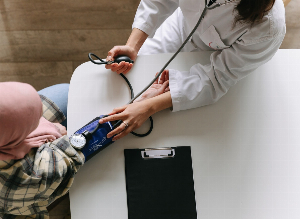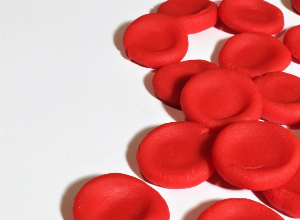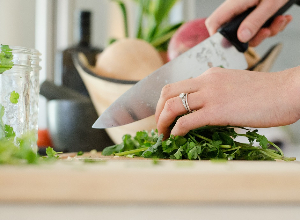Non-Hodgkin lymphoma: "We don't think about recovery, but about death"
Published 8 Sep 2021 • By Aurélien De Biagi
Vibracaise16, a member of the Carenity community in France, has non-Hodgkin lymphoma. Between the shock of the diagnosis and the side effects of the treatment, she shares with us her experience of the disease!
Read her story below!

Hello Vibracaise16, thank you for agreeing to share your story with us on Carenity.
First of all, could you tell us a bit about yourself?
My name is Sophie, I am married, and I work with my husband in funerary services in the Charente department of southwestern France.
I love nature, socialising with friends and animals.
How long have you had non-Hodgkin lymphoma? What symptoms led you to seek help?
The first symptoms of my High-grade B-cell lymphoma (HGBL) with thrombosis, occurred in March 2020. Little did I know then that the next few weeks would turn into a nightmare, with headaches, sore throats, hoarse voice, breathing problems (my nose was becoming blocked), loss of smell and taste (nothing to do with COVI-19 even though this is what I was told several times during isolation in the emergency room).
My doctor was very responsive and supportive. He referred me to an ENT who, after a nasofibroscopy, immediately thought of cancer, a word that my brain did not want to hear. Only a biopsy could confirm the diagnosis. Two other ENT doctors took turns doing a nasofibroscopy and finally a biopsy to find out what was behind my nasal cavity.
How did you handle the diagnosis?
I had a very hard time with the delay in diagnosis, because from March to the end of May, when I was emergency hospitalised, the persistent pain and the discomfort of morphine seemed insurmountable.
How can you explain that in the middle of a lockdown, the emergency service prescribes you paracetamol which, in my case, was useless?
How did your loved ones react to your diagnosis? Do they understand your cancer? Are they supportive?
Both my family and I were stunned. Cancer, when it hits you very close to home, destroys you. You don't think of recovery but of death at first. My family supported me and the few friends who didn't jump ship.
At what stage is your cancer?
As of August 2021, I have been in remission since mid-November 2020 with ongoing, intense fatigue.
Where were or are your day-to-day symptoms? How has non-Hodgkin lymphoma impacted your professional and personal life? What treatments have you had and were they effective? Did you have any side effects?
I was hospitalised from the end of May 2020 to mid-July of the same year, on morphine, and I was completely destabilised with the loss of taste and smell. My brain had no reference points. The vomiting due to the morphine and then the chemo was difficult to manage despite the medication that was supposed help. I was fitted with an implantable port (a permanent catheter line for long-term injectable treatments) which had to be removed after the fifth round of chemo because it had gotten infected. It was replaced by a PICC line (a peripherally inserted central catheter) which was also removed 15 days later because I got a staphylococcal infection. My last three rounds of chemotherapy were done through the normal route.
My first two chemo's were done by lumbar puncture every 15 days and then every 3 weeks; a protocol of 8 sessions lasting over 5 hours.
My professional life is on hold. Recognised as disabled, I am on sick leave. My cancer and the thrombosis have led to vomiting, anaemia, weight and hair loss, brittle nails, a period of constipation, capsulitis (narrowing of the capsule, i.e., the layer of tendons, ligaments and soft tissues around the toes) and algodystrophy (also known as complex regional pain syndrome (CRPS), chronic pain in one or more extremities) in my left arm and hand.
As for my general health, I broke my hip in February. This has affected my married life. Working with my husband in a busy job, you can understand that the situation was destabilising. It is difficult to summarise this period of my life which I would sincerely like to forget.
Have you had to adapt your lifestyle or daily routine?
I mentioned earlier that I lost my sense taste and smell, so I developed a real problem with rejecting food because my brain was destabilised by it all. Pasta was one of the only foods my brain and stomach would accept.
What do you think of the medical or psychological care you received?
My care was a little complicated because of the lockdown, which surely didn't make things easier. The hospital psychologist helped me as best she could, and the HAH (Hospitalisation at Home) care filled in some gaps.
During this period, as a cancer patient, I really felt isolated.
What do you think about online patient communities like Carenity? Are you able to find the advice and support you're looking for?
I am glad that there are sites like Carenity where you can find a lot of advice and support that helps you in your daily life and keeps you from feeling alone. Sharing your experiences of illness and recovery strengthens you in this fight, which you may or may not win, but there is hope. Every good intention is positive and beneficial.
Finally, what advice would you give to other Carenity members facing cancer?
It's easier said than done, but I would advise that you inform yourself about the mechanics and possible side effects of chemotherapy and to accept all the help you can get.
Many thanks to Vibracaise16 for sharing her story with us on Carenity!
Was this testimonial helpful to you?
Give it a like and share your thoughts and questions with the community in the comments below!
Take care!

 Facebook
Facebook Twitter
Twitter


